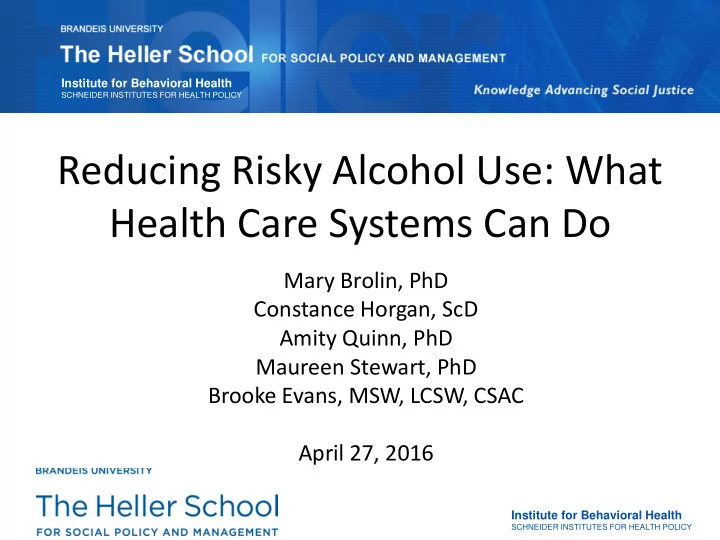

Institute for Behavioral Health SCHNEIDER INSTITUTES FOR HEALTH POLICY Reducing Risky Alcohol Use: What Health Care Systems Can Do Mary Brolin, PhD Constance Horgan, ScD Amity Quinn, PhD Maureen Stewart, PhD Brooke Evans, MSW, LCSW, CSAC April 27, 2016 Institute for Behavioral Health SCHNEIDER INSTITUTES FOR HEALTH POLICY
Disclaimer Funding for the report and forum was made possible (in part) by the Centers for Disease Control and Prevention. The views expressed in the presentation and written materials do not necessarily reflect the official policies of the Department of Health and Human Services, nor does the mention of trade names, commercial practices, or organizations imply endorsement by the U.S. Government.
Our Society Faces Many Problems Institute for Behavioral Health SCHNEIDER INSTITUTES FOR HEALTH POLICY
Doctors Face Similar Challenges with Their Patients Institute for Behavioral Health SCHNEIDER INSTITUTES FOR HEALTH POLICY
Where do we focus our efforts, time and resources?
Must Answer Two Key Questions Is there evidence of a: Problem Solution Risky drinking has both Institute for Behavioral Health SCHNEIDER INSTITUTES FOR HEALTH POLICY
What is risky drinking and how much of a problem is it?
Risky Drinking • Any level of alcohol use that increases risk of harm to a person’s health or well-being or that of others • Most risky drinkers are NOT dependent Grant BF, et al., 2004; Dawson DA, et al., 2004 Institute for Behavioral Health SCHNEIDER INSTITUTES FOR HEALTH POLICY
1 out of 4 Adults Engage in Risky Drinking US Adults MA Adults • 79.7 million risky • 1.3 million risky drinkers drinkers • 17.4% past month • 17.4% past month binge drinking binge drinking • 5.9% past month • 7.0% past month heavy alcohol use heavy alcohol use Institute for Behavioral Health SCHNEIDER INSTITUTES FOR HEALTH POLICY
Risky Alcohol Use has Serious Consequences Can Increased risk 240 alcohol Can lead to complicate of injuries, related health illnesses such violence and deaths per problems as diabetes, birth defects day such as hypertension, cirrhosis and and cancer depression Institute for Behavioral Health SCHNEIDER INSTITUTES FOR HEALTH POLICY
Risky Drinking is Expensive $249 billion in the US in 2010 $5.6 billion in MA $861 per capita in MA Binge drinking leads to ¾ costs Reducing risky drinking can save billions and improve lives
How can we reduce risky drinking?
Alcohol Screening and Brief Intervention is Effective Alcohol SBI is effective for adults in primary care outpatient settings (Saitz, 2010, Kaner et al., 2009, Bertholet et al., 2005) Alcohol SBI reduces: Driving under Alcohol use Hospitalizations Injuries Mortality the influence Institute for Behavioral Health SCHNEIDER INSTITUTES FOR HEALTH POLICY
Alcohol SBI: a Prevention and Early Intervention Approach Screening Brief Intervention Asking a valid set of A short conversation screening questions to about the harmful effects identify patients’ drinking of risky drinking with patterns patients who are drinking too much Institute for Behavioral Health SCHNEIDER INSTITUTES FOR HEALTH POLICY
Alcohol SBI is Cost Effective Ranks 4 th out of 25 preventive services Saves average of $218 per patient per year Could save $1.17 billion annually in MA if all adults received alcohol SBI Institute for Behavioral Health SCHNEIDER INSTITUTES FOR HEALTH POLICY
Despite evidence, screening and brief intervention are limited Why?
Physician Challenges Limited time with patient Lack of training Discomfort with subject Limited of billing options Institute for Behavioral Health SCHNEIDER INSTITUTES FOR HEALTH POLICY
Health System Reforms Offer Opportunities Patient- Accountable centered Care medical homes Organizations Integrated care
Health plan policies encouraging the use of SBI for alcohol problems in primary care, 2010 99.0% % of products 51.4% 40.7% 5.8% 3.4% Provision of Financial Feedback to Training Recognition guidelines incentives providers programs Horgan et al., 2014 Institute for Behavioral Health SCHNEIDER INSTITUTES FOR HEALTH POLICY
Health Plans Can Implement Specific Supportive Strategies Implementing performance measures Reimbursing or using alternative payment models, including pay for performance Providing incentives for clinical practice Implementing SBI directly in the health plan Supporting EHRs and decision-support software Providing training and coaching Institute for Behavioral Health SCHNEIDER INSTITUTES FOR HEALTH POLICY
Local and National Providers Offer Key Lessons SSTAR, CHA, MGH, VHA, Kaiser, HealthPartners Performance and Training and Universal EHR and decision accountability Leadership technical approach support measures assistance Creating a new Screen Smart phrases Guide behaviors Skills training culture Further Support for new Coaching on Need to monitor assessment if Clinical reminders ways of doing workflow and quality needed business staffing Physician and/or other staff Tracking complete BI’s if performance needed Institute for Behavioral Health SCHNEIDER INSTITUTES FOR HEALTH POLICY
Resources are Available Institute for Behavioral Health SCHNEIDER INSTITUTES FOR HEALTH POLICY
Our Goal: Screen 50% of MA adults annually for risky alcohol use by 2020 and 75% by 2025
Benefits to reaching this goal Health improvements for Massachusetts residents Cost savings of nearly $1 billion Institute for Behavioral Health SCHNEIDER INSTITUTES FOR HEALTH POLICY
To achieve these goals we need to: Identify promising approaches to implement alcohol SBI Attend our follow-up Ensure payment supports strategy meeting with reduction of risky health plans, delivery drinking systems, CDC and NACDD Use performance measures to drive change Institute for Behavioral Health SCHNEIDER INSTITUTES FOR HEALTH POLICY
Recommend
More recommend